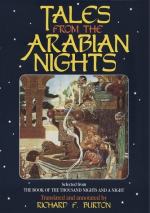[FN#30] The usual delicate chaff.
[FN#31] Such letters are generally written on a full-sized sheet of paper ("notes” are held slighting in the East) and folded till the breadth is reduced to about one inch. The edges are gummed, the ink, much like our Indian ink, is smeared with the finger upon the signet ring; the place where it is to be applied is slightly wetted with the tongue and the seal is stamped across the line of junction to secure privacy. I have given a specimen of an original love-letter of the kind in “Scinde, or the Unhappy Valley,” chaps. iv.
[FN#32] Arab. “Salb” which may also mean hanging, but the usual term for the latter in The Nights is “shanak.” Crucifixion, abolished by the superstitious Constantine, was practised as a servile punishment as late as the days of Mohammed Ali Pasha the Great e malefactors were nailed and tied to the patibulum or cross-piece without any sup pedaneum or foot-rest and left to suffer tortures from flies and sun, thirst and hunger. They often lived three days and died of the wounds mortifying and the nervous exhaustion brought on by cramps and convulsions. In many cases the corpses were left to feed the kites and crows; and this added horror to the death. Moslems care little for mere hanging. Whenever a fanatical atrocity is to be punished, the malefactor should be hung in pig-skin, his body burnt and the ashes publicly thrown into a common cesspool.
[FN#33] Arab “Shaytan” the insolent or rebellious one is a common term of abuse. The word I. Koramc, and borrowed as usual from the Jews. “Satan” occurs four times in the O.T. of which two are in Job where, however, he is a subordinate angel.
[FN#34] Arab. “Alak” from the Koran xxii. 5. " O men...consider that we first created you of dust (Adam); afterwards of seed (Rodwell’s “moist germs of life"); afterwards of a little coagulated (or clots of) blood.” It refers to all mankind except Adam, Eve and Isa. Also chaps. xcvi. 2, which, as has been said was probably the first composed at Meccah. Mr. Rodwell (v. 10) translates by ’Servant of God” what should be “Slave of Allah,” alluding to Mohammed’s original name Abdullah. See my learned friend Aloys Sprenger, Leben, etc., i.155.
[FN#35] The Hindus similarly exaggerate: “He was ready to leap out of his skin in his delight” (Katha, etc., p. 443).
[FN#36] A star in the tail of the Great Bear, one of the “Banat al-Na’ash,” or a star close to the second. Its principal use is to act foil to bright Sohayl (Canopus) as in the beginning of Jami’s Layla-Majnun:—
To whom Thou’rt
hid, day is darksome night:
To whom shown, Soha
as Sohayl is bright.
See also al-Hariri (xxxii. and xxxvi.). The saying, “I show her Soha and she shows me the moon” (A. P. i. 547) arose as follows. In the Ignorance a beautiful Amazon defied any man to take her maidenhead; and a certain Ibn al-Ghazz won the game by struggling with her till she was nearly senseless. He then asked her, “How is thine eye-sight: dost thou see Soha?” and she, in her confusion, pointed to the moon and said, “That is it!”




